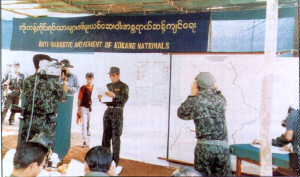The Northern Shan State Special Region (1) Kokang National Group
|
Kokang national group led by U Phon Kya Shin left the Burma Communist Party in 1989 and made peace with the Government. The Government designated the Kokang region as the Northern Shan State Special Region No. (1). Their base region are the Northern Shan State, the Chinese-Myanmar Border, Mon Ko, Laukkai and Kokang |
||
|
areas. Those are the areas where
poppy had been grown in large quantity since the British Colonial era. For decades, the local people relied upon opium trade as their main source of income and were also allowed to consume opium. Once peace has been achieved, the Kokang National Group, with the assistance of the Government, has undertaken the development programmes in their region At the same time, in accord with the State policy, they have carried out plans to eradicate narcotic drugs. Special forces responsible for prevention and eradication of narcotic drugs were formed and were given special assignments.
Since they made peace with the Government in 1990, The Kokang National Group’s Special Forces, on different |
|
| Kokang
national leader U Phone Kya Shin addressing at a destruction ceremony of seized narcotic drugs in Laukai of Kokang region. (22-11-9-) |
||
| occasions, have seized and destroyed large quantities of opium, heroin, marijuana, and
chemicals for the refineries and its paraphernalia. Seized opium refineries were also set ablaze. |
||
Several Ceremonies for the torching of narcotic drugs were held in the presence of local Government authorities and, when they were held at the Myanmar-Chinese border, the Chinese local authorities also took part in the ceremonies.
Destruction and clearing of poppy fields in the region was also a very effective exercise, which gave added thrust to the prevention and eradication task. Thousands
of acres of poppy fields in the Kokang region were smashed and destroyed by the local people
and the Tatmadaw.
In order to sustain its efforts to eradicate opium, Kokang National Group
issued a number of restriction orders and penalties relating to the prevention and
suppression of narcotic drugs in the region.
Under the guidance and with the advice of the Secretary (1) of the State Peace and Development Council, the Kokang National Group has occasionally held coordination meetings and agreed to observe the following guidelines: to designate Kokang region an Opium Free Zone by the year 2000; from 1997 onward opium plantations along the Myanmar Chinese border will not be allowed and found will be dealt with severely; starting from 1997/98 opium growing season, opium
growing acreage will be r educed to half and will not be allowed at all by the year 2000; will
encourage and support cultivation of wheat, sesame and maize as substitution crops; will
enact law stipulating eradication of narcotic drugs as a national task.
In accord with the above guidelines adopted by the coordination meeting, the Kokang
National Group, with the support of the Government, had increased its efforts in all aspects of opium elimination activities. Substitute crops, such as rubber, maize, beans and pulses, wheat, sugar-cane,
lychee, castor oil plant, mustard oil plant etc. were grown in the region covering some thousands of acres.
Efforts are being made by the Kokang National Group leader U Phone Kya
Shin to open a Museum at a cost of Kyats 180 lakhs in commemoration of the total elimination of
narcotic drugs in the region.
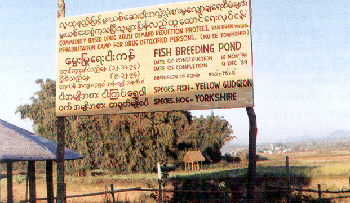 |
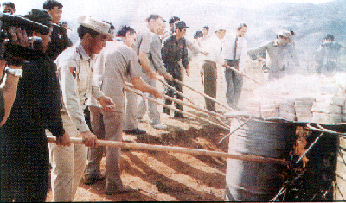 |
| Livestock
breeding farm at the Muse Rehabilitation Station. |
Setting
ablaze of narcotic drugs seized by Special Region (1) in Kokang Region, Northern Shan State (22-11-90) |
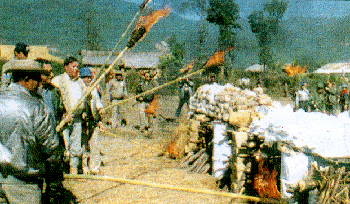 |
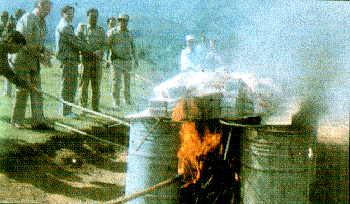 |
| Setting
ablaze of narcotic drugs by the Kokang National in Monkoe region. |
Setting
ablaze of an opium refinery near Laukkai, Kokang region. |
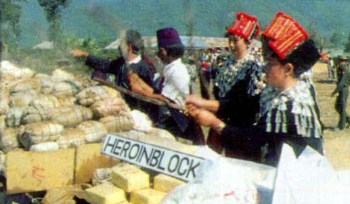 |
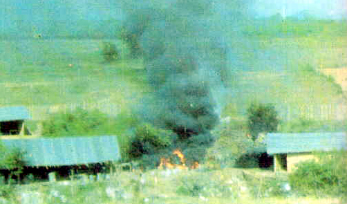 |
| Local
nationals attending Anti-Narcotic Ceremony held by Kokang nationals in Mongkoe region. |
Opium
refinery set ablaze by the Kokang nationals in Laukai. |
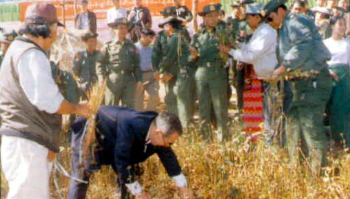 |
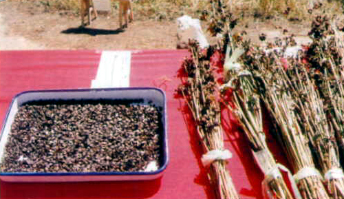 |
| Secretary-1
and party viewing the flourishing Japanese Buckwheat plantations at Laukai, Kokang Region. |
Japanese
buckwheat seeds after harvest. |
